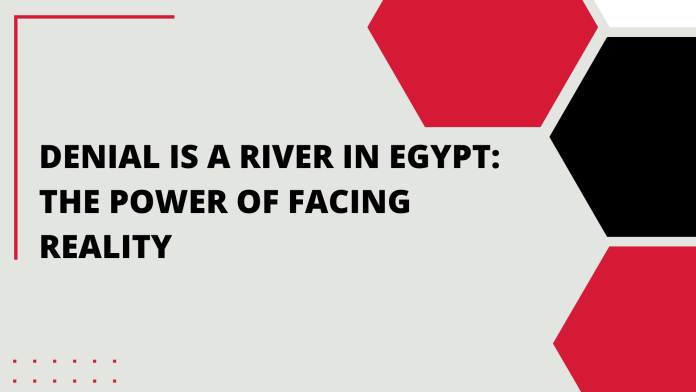Table of Contents
- Introduction
- Understanding Denial
- The Origins of the Phrase
- Types of Denial
- Psychological Denial
- Climate Change Denial
- Political Denial
- The Consequences of Denial
- Breaking the Cycle
- Recognizing Denial in Everyday Life
- Facing Personal Denial
- Denial in the Digital Age
- The Role of Media
- Overcoming Denial: Steps to Take
- Self-Reflection
- Seeking Professional Help
- Encouraging Open Dialogue
- The Importance of Acceptance
- Conclusion
- Frequently Asked Questions
Introduction
Denial, often referred to as “Denial is a river in Egypt,” is a powerful psychological defense mechanism that humans employ to protect themselves from uncomfortable truths. This article explores the concept of denial, its various forms, and the consequences it can have on individuals and society as a whole. We will also discuss strategies to overcome denial and the importance of acceptance in personal growth and societal progress.
Understanding Denial
Denial is the act of refusing to accept or acknowledge a reality or truth, often due to fear, guilt, or cognitive dissonance. It is a coping mechanism that allows individuals to shield themselves from painful emotions or inconvenient facts.
The Origins of the Phrase
The phrase “Denial is a river in Egypt” is often used humorously to highlight someone’s refusal to face the truth. While it’s not historically accurate, it serves as a witty reminder of how people can avoid reality.
Types of Denial
Psychological Denial
Psychological denial is perhaps the most common form. It occurs when an individual consciously or unconsciously avoids accepting their own feelings, behaviors, or past traumas.
Climate Change Denial
In recent years, climate change denial has gained prominence. Despite overwhelming scientific evidence, some individuals and organizations deny the reality of climate change, endangering our planet’s future.
Political Denial
Political denial involves the rejection of facts or events that don’t align with one’s political beliefs. In today’s polarized world, this type of denial can have far-reaching consequences.
The Consequences of Denial
Denial can lead to a multitude of negative outcomes, both personally and societally. It hinders personal growth, prevents effective problem-solving, and can even contribute to the spread of misinformation.
Breaking the Cycle
Breaking free from denial is essential for personal development. It requires self-awareness, courage, and a willingness to confront uncomfortable truths.
Recognizing Denial in Everyday Life
Denial isn’t limited to significant life events; it can manifest in everyday situations. Recognizing when you’re in denial is the first step toward positive change.
Facing Personal Denial
To grow as individuals, we must confront our own denials. Whether it’s acknowledging a strained relationship or addressing addictive behaviors, facing the truth is the path to healing.
Denial in the Digital Age
The digital age has introduced new challenges related to denial, such as the spread of fake news and echo chambers on social media.
The Role of Media
Media plays a significant role in shaping our perceptions. Responsible journalism and media literacy are crucial for combating denial and misinformation.
Overcoming Denial: Steps to Take
Self-Reflection
Self-reflection is key to recognizing denial in our lives. It involves introspection and a willingness to question our beliefs and behaviors.
Seeking Professional Help
In cases of deep-seated denial, seeking professional therapy or counseling can provide valuable guidance and support.
Encouraging Open Dialogue
Promoting open and respectful dialogue allows for the exchange of ideas and the dismantling of denial-fueled barriers.
The Importance of Acceptance
Acceptance is the antidote to denial. Embracing reality, no matter how uncomfortable, is essential for personal growth and societal progress.
Conclusion
Denial may be a familiar coping mechanism, but its consequences can be far-reaching. By acknowledging and confronting denial in our lives, we pave the way for personal development and a more informed, open-minded society.
Frequently Asked Questions
- What is denial, and why do people engage in it?
Denial is the act of refusing to accept or acknowledge a reality or truth due to fear, guilt, or cognitive dissonance. People engage in denial as a defense mechanism to protect themselves from uncomfortable emotions or facts.
- How can I recognize if I’m in denial?
Self-reflection and a willingness to question your beliefs and behaviors are essential for recognizing denial. Look for patterns of avoidance and rationalization.
- What are the consequences of climate change denial?
Climate change denial can lead to environmental degradation, hinder efforts to combat climate change, and jeopardize the future of our planet.
- How can I encourage open dialogue in a polarized world?
Encouraging open dialogue involves actively listening to others, seeking common ground, and promoting respectful communication, even with those who hold opposing views.
- Why is acceptance important?
Acceptance is crucial for personal growth and societal progress. Embracing reality allows us to make informed decisions and work towards positive change.

